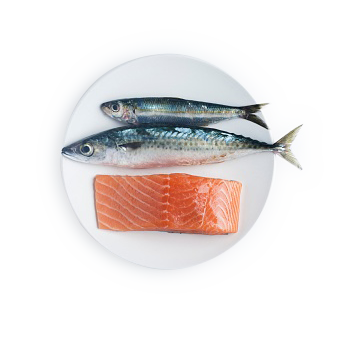HEALTHY FATS

Omega-3 fatty acids: why are EPA and DHA so important?
Over the past two decades, medical scientists have discovered that many diseases of civilization – from cancer to heart disease, depression, ADHD, skin problems, allergies, osteoarthritis, fatigue, and others – are caused or exacerbated by a significant deficiency of omega-3 fatty acids in today’s Western diet. Epidemiological studies (i.e., studies of different population groups) revealed that groups that consume more omega-3 fatty acids have a lower risk of cardiovascular disease, prostate cancer, or Alzheimer’s disease. Clinical studies – where one part of the patients received omega-3 dietary supplements and another a placebo (fake supplement) – showed that omega-3 fatty acids reduce the severity and symptoms of conditions such as depression, character disorders, aggressiveness, risks after a heart attack, and attention disorders. In other words, a deficiency of omega-3, in particular EPA and DHA, increases the risk of many disorders, and taking an omega-3 supplement reduces the severity and symptoms of those disorders.
Extra virgin olive oil contains hydroxytyrosol

Olive oil is a precious source of health, at least if you choose quality. A term like “first, cold pressing” means nothing these days. Increasingly powerful presses are being used that extract the oil from the olives all at once. What is a critical quality characteristic, however, is acidity. Olive oil of the highest quality is called “extra virgin’.

Technically, the oil contains a maximum acidity of 0.8% (free fatty acids). Indirectly, the low acidity is related to the picking period and the time between picking and processing the olives – which benefits the oil’s aroma, color, taste, and composition. Of all olive oils, extra virgin olive oil contains the highest amount of vitamin E and the highest content of polyphenols (including hydroxytyrosol). Hydroxytyrosol is a crucial antioxidant worth taking a moment to consider. High-quality extra virgin olive oil easily contains 5 mg of hydroxytyrosol and its derivatives (including oleuropein complex and tyrosol) per 20 g of oil. Polyphenols from olive oil help prevent oxidation of LDL (bad) cholesterol. This will make the bad cholesterol less likely to stick to the inside of a blood vessel, thus preventing arteriosclerosis. Research shows that a daily intake of olive oil with 5 to 10 mg of hydroxytyrosol has a positive effect. Ten milligrams is roughly the level of hydroxytyrosol found in 6 olives. So remember to add some olives to your menu once in a while. They are good for your circulatory system. Introducing olive oil into your diet, by the way, is also ideal for achieving healthy cholesterol levels.
GOOD TO KNOW
Advice for using oils and fats
• Eat food rich in omega-3 fatty acids, such as walnuts, flaxseed oil, green leafy vegetables, and – in limited quantities or at most twice a week – fish, including oily fish (trout, herring, mackerel, sardines). Pregnant and breastfeeding women should not eat shark (e.g., shark fin soup), marlin (sailfish), swordfish, king mackerel, and tilefish because these predatory fish contain too much methylmercury. Methylmercury is a heavy metal and toxic to the baby’s brain.
• Take a 100% pure pharmaceutical-grade fish or algae oil supplement containing at least 500 mg EPA+DHA daily. A minimum of 1000 mg EPA+DHA daily (usually slightly more EPA than DHA) is recommended for optimal health.
• Limit saturated fatty acids by eating lean meat instead of fatty meat and semi-skimmed or low-fat dairy products instead of whole or heavy dairy products.
• Avoid oils and other foods rich in omega-6 fatty acids (linoleic acid), such as sunflower, safflower, and corn oil. If consumed too frequently, the excessive content of linoleic acid can be very pro-inflammatory.
• Avoid all products containing trans fatty acids, especially margarine, including “light” versions and margarine sold as cholesterol-lowering. Margarines are hydrogenated fatty acids and contain trans fatty acids, carriers of free radicals. They are deficient in essential fatty acids such as gamma and alpha-linolenic acids and usually lack EPA and DHA. In the long run, the consumption of margarine is harmful to your health. So limit their use.
• Instead, spread organic, unsalted farm butter on your bread in moderation, or use olive oil.
• Avoid industrial products containing trans fats, such as salty snacks, commercial pastries, and frozen fried foods.
• Use monounsaturated oils such as olive oil to prepare foods. Cold-pressed, fresh, unrefined organic oils contain natural vitamin E and carotenoids. Daily, use fresh, raw virgin olive oil (omega-9 monounsaturated fatty acid) and fresh organic omega-3 plant oils (super unsaturated fatty acids). Do pay attention to freshness, not only through the expiration date but primarily through the pressing date.
• The refining process in “light products” destroys natural vitamin E and beta-carotene, which is why many producers of refined oils state “enriched with vitamin E and beta-carotene” on the packaging. This sounds nice but means absolutely nothing. Do not be misled by this.
• Do not store products containing egg powder, milk powder, and butter at room temperature for long periods. Also, keep oil and fresh nuts in the refrigerator at all times.
Facts about heating oils:
Up to a maximum of 45 degrees Celsius:
Super-unsaturated fatty acids, such as flax seed, chia, and perilla oils (vegetable sources of omega-3), soybean oil, walnut oil, hemp oil, and canola oil (all rich in omega-6 but poorer in omega-3) should not be heated because they oxidize very quickly. Therefore, use them only cold (for example, in dressings or with yogurt) and possibly added to soups (only just before serving).
Up to a maximum of 100 degrees Celsius:
Polyunsaturated fatty acids (omega-6) such as safflower, sunflower, and pumpkin oil become toxic or carcinogenic above 100 °C.
Up to a maximum of 160 degrees Celsius:
Monounsaturated fatty acids (omega-9) such as sesame, olive, hazelnut, groundnut, and pistachio oil acquire carcinogenic properties if one heats them above 160 °C or when smoke is generated. If one does not heat them above 160 °C, they remain stable and retain their flavor and healthy properties.
Up to 190-200 degrees Celsius:
Saturated fatty acids such as ox fat, palm kernel, and coconut oil can be heated to 190-200 °C. You can use them for frying and deep-frying, but replacing them with fresh oil after frying up to two times is strongly recommended. Only oils that harden at low temperatures (in the refrigerator) are fats that can generally tolerate high temperatures. These oils do increase cholesterol but eliminate the risk of carcinogenic oxidation.